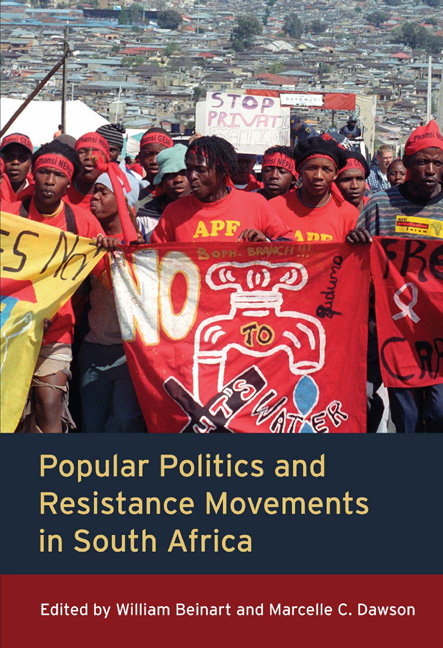Book contents
- Frontmatter
- Contents
- Contributors
- List of Abbreviations and Acronyms
- 1 Popular politics and resistance movements in South Africa, 1970–2008
- 2 The Durban strikes of 1973: Political identities and the management of protest
- 3 ‘There's more to it than slurp and burp’: The Fatti's & Moni's strike and the use of boycotts in mass resistance in Cape Town
- 4 The role of the African National Congress in popular protest during the township uprisings, 1984–1989
- 5 Strategies of struggle: The Nelson Mandela campaign
- 6 From removals to reform: Land struggles in Weenen in KwaZulu-Natal, South Africa
- 7 From popular resistance to populist politics in the Transkei
- 8 ‘It's a beautiful struggle’: Siyayinqoba/Beat it! and the HIV/AIDS treatment struggle on South African television
- 9 The Nelson Mandela Museum and the tyranny of political symbols
- 10 Black nurses’ strikes at Baragwanath Hospital, Soweto, 1948–2007
- 11 The ‘New Struggle’: Resources, networks and the formation of the Treatment Action Campaign (TAC) 1994–1998
- 12 New social movements as civil society: The case of past and present Soweto
- 13 ‘Phansi Privatisation! Phansi!’: The Anti-Privatisation Forum and ideology in social movements
- Endnotes
- Bibliography
- Index
10 - Black nurses’ strikes at Baragwanath Hospital, Soweto, 1948–2007
Published online by Cambridge University Press: 21 April 2018
- Frontmatter
- Contents
- Contributors
- List of Abbreviations and Acronyms
- 1 Popular politics and resistance movements in South Africa, 1970–2008
- 2 The Durban strikes of 1973: Political identities and the management of protest
- 3 ‘There's more to it than slurp and burp’: The Fatti's & Moni's strike and the use of boycotts in mass resistance in Cape Town
- 4 The role of the African National Congress in popular protest during the township uprisings, 1984–1989
- 5 Strategies of struggle: The Nelson Mandela campaign
- 6 From removals to reform: Land struggles in Weenen in KwaZulu-Natal, South Africa
- 7 From popular resistance to populist politics in the Transkei
- 8 ‘It's a beautiful struggle’: Siyayinqoba/Beat it! and the HIV/AIDS treatment struggle on South African television
- 9 The Nelson Mandela Museum and the tyranny of political symbols
- 10 Black nurses’ strikes at Baragwanath Hospital, Soweto, 1948–2007
- 11 The ‘New Struggle’: Resources, networks and the formation of the Treatment Action Campaign (TAC) 1994–1998
- 12 New social movements as civil society: The case of past and present Soweto
- 13 ‘Phansi Privatisation! Phansi!’: The Anti-Privatisation Forum and ideology in social movements
- Endnotes
- Bibliography
- Index
Summary
Introduction
This chapter investigates a series of nurses’ strikes that took place at Baragwanath Hospital between its opening as a provincial hospital serving black patients in 1948 through to the post-apartheid era. During this time Baragwanath experienced four major nurses’ strikes in 1949, 1958, 1985 and 1995 and two major, broader civil servants’ strikes in 1992 and 2007 that had significant effects on nurses.
Until the end of apartheid, nursing and teaching were the only professional options available to black women in South Africa. Shula Marks, in her ground-breaking study of the nursing profession in South Africa, remarks that the number of black professional nurses far outnumbered black male elites. Thus, black women nurses formed a very significant sector of the professional labour force in South Africa. Yet very little academic attention has been paid to black nurses in general or the ways in which they engaged in civil action and strikes. Nursing is a gendered profession that takes place in the gendered hospital space. In the hospital setting, male workers – often doctors, who are perceived as having a higher status – form the main subjects of research. Even in this collection, male workers and their actions or male protagonists are prominent. This chapter attempts to begin to fill this gap by addressing the protest actions of nurses at South Africa's largest specialist hospital serving predominantly black patients. Nurses are particularly important, not only because they are perhaps the largest group of professional black women in South Africa, but also because the history of nursing provides a good perspective on public service workers, who have become increasingly important in South Africa.
For much of the period under discussion, power at Baragwanath Hospital lay in the hands of the white, mostly male administration and the predominantly white, male doctors. Yet nurses, who were predominantly black women, were the backbone of the hospital. This gave them some power should they choose to withdraw their labour in protest. Nurses, however, belonged to a profession that frowned on such action. This left them in a somewhat ambiguous position – a central contradiction explored in this chapter.
- Type
- Chapter
- Information
- Popular Politics and Resistance Movements in South Africa , pp. 207 - 226Publisher: Wits University PressPrint publication year: 2010



